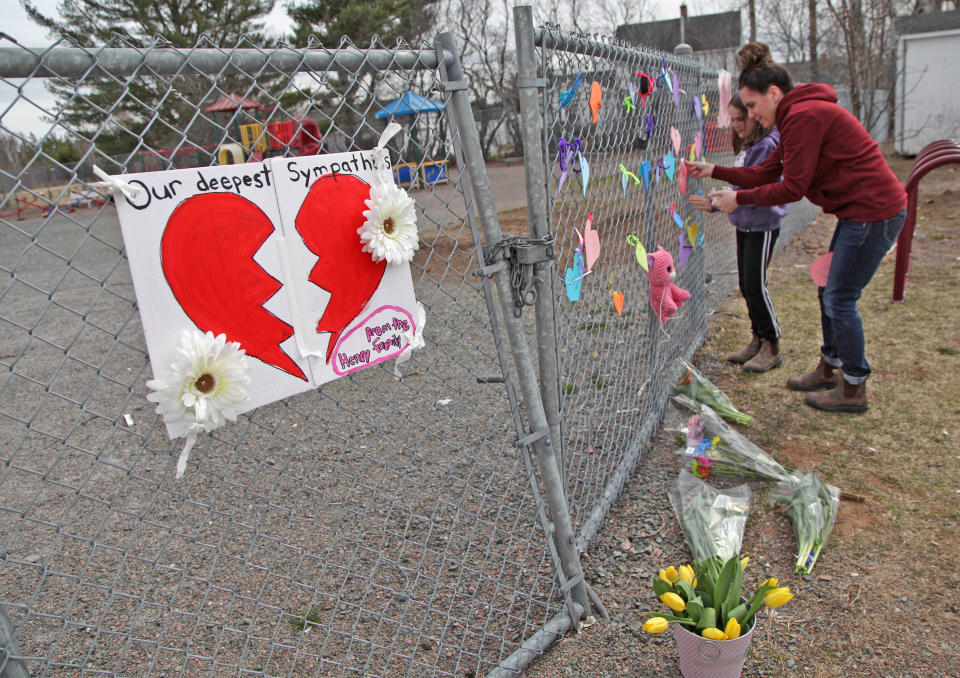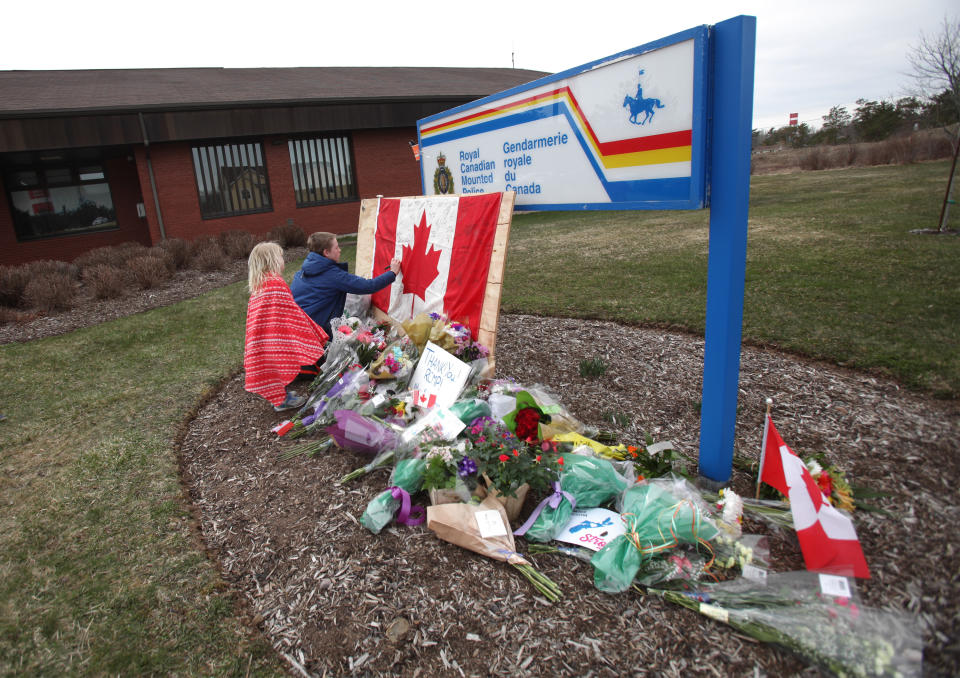Lack of gatherings will slow healing process for loved ones of Portapique victims
When Canadians see their fellow countrymen killed, their resiliency against hate and evil is shown through numbers — numbers of hugs, numbers of vigils, and large numbers at funerals. This past weekend’s shootings in Portapique, N.S. where at least 23 are confirmed dead, will be an especially lonely time considering the restrictions of gatherings in the province due to the pandemic.
“It’s going to be hard on their loved ones, because everything that they do is going to remind them that they're not doing exactly what they want — they can’t touch, they can’t give someone a hug,” said Karen Blair, Associate Professor of Psychology at St. Francis University in Nova Scotia.
It is an unprecedented time in Canadian history where many people are advised not to leave their homes and mass gatherings are banned. However it will make the healing process for a community, a province, and a country in the wake of the biggest mass shooting in its history feel incomplete.
“This is unique given the unexpected violence of these people’s deaths, but not being able to say goodbye or see their loved ones one last time is a shared experience across the globe right now,” she said.

Portapique is based in rural Nova Scotia, approx. 120 kilometres north of Halifax with a population of around 250 people, but for those who live in small provinces, Blair notes that every person is just six degrees of separation away.
“Nearly everyone in Nova Scotia will have some sort of connection, big or small to someone who was killed which is unfathomable, to have that deep connection,” she said.
RCMP confirmed shootings took place at sixteen different locations across the town, and at least five structure fires were set, which have not yet been investigated.
The killer is described as a 51-year-old man, who was a denturist and wore an RCMP-lookalike uniform and refitted his vehicle to look like a police car.
In some cases, loved ones may not necessarily be able to even hold funeral processions for the victims. For example, in response to Nova Scotia RCMP Const. Heidi Stevenson being killed in action, police forces would normally have sent officers to join a regiment procession, but a handful across the country have said they will not be sending anyone given the ongoing pandemic.
“Funerals, death rituals are important to all people...it’s going to have an impact on the sense of having closure,” said Blair.

However, social and physical distancing did not stop Nova Scotians from showing their support. Whether they lined up six feet apart all the way to their local detachments, or dropped off flowers or shared a photo, they’re still showing their love despite the extenuating circumstances.
“The flip side is we’ll get to see the beauty and creativity in humans and the lengths they will go to create that sense of a community, they will do this in a unique way,” she said.
Usually in times of grief, Canadians rally together. Following the Quebec Mosque shooting in 2017, dozens of vigils were held across Canada, including one in Quebec which the Prime Minister attended. During the gathering, speeches were given, and following the procession people walked to the site of the shootings. But, none of that is possible now, as COVID-19 recommendations limit touch, mass gatherings and being within six feet of someone.
Blair has studied the aftermath of mass shootings, and specifically the collective grief process felt by community members, loved ones and people online.
“The natural reaction in times like this is to come together in large groups, the exact things we cannot do, this is going to exacerbate the struggles for those in the community with not being able to see the people they care about,” she said.
In some circumstances, people are living alone or just with their small families, and while they’ve lost loved ones, they cannot reach out for the in-person help they need.
“I can’t imagine for people who are truly living alone right now, this is going to be incredibly challenging, this will exacerbate all the mental health challenges which are already being pushed to the limit by COVID,” said Blair.
With over a month of stay-at-home orders for Nova Scotians in place, Blair notes that many people are already likely feeling affected by being constrained and these events will compound depreciating mental health symptoms.
“People are already at risk with heightened levels of mental health issues such as loneliness, depression and anxiety simply because of the pandemic,” she said.
Importance of vigils, gatherings following mass shooting
Through Blair’s career she has studied the effects of mass gatherings and vigils following; the 2016 Pulse nightclub shooting in Orlando, Fla. which left 50 dead; the Pittsburgh, Penn. synagogue shooting where 11 were killed; and Christchurch, New Zealand shooting in 2019 where a gunman killed 51 people at two different mosques.
All three of the shootings had different targets, but all three had a common thread in terms of healing, according to Blair.
“The common thread across all of those in terms of how people were responding and how they worked through their grief was the ability to come together and hold vigils and be reminded of connections in the community,” said Blair.
Some Haligonians describe the tiny northern community as being religious and church-going people, and Blair said her research shows gatherings to show solidarity would have helped in the healing process.
“After Pittsburgh it was important for Jewish people to gather with Jewish people and with broader community members, we saw the same in Christchurch for Muslim people,” said Blair.
Following the Pulse shootings, the LGBTQ communities in different cities across the world used their annual Pride festival to showcase and pay homage to the victims.
“Pulse was important because all the Pride festivals took on a new meaning, they became places for people to grieve openly,” said Blair.

Importance of touch
Most of the initial mourning done by families will take place in their homes or private settings, with no one able to share or celebrate the lives of those taken from them.
“This is human evil that is taking people’s lives, it makes people want to come together and tell their stories of their loved ones, to celebrate them,” said Blair.
Blair notes that the touch of a hand on the shoulder, burrowing your face into someone's chest to cry, or a hug can be a massive comfort for those who feel lonely during death.
“Physical touch is so important for our mental wellbeing and health, and especially in a time of grief, people want to hold each other.” she said.
The togetherness of a vigil and a time of solitude against hate and in support of a sense of community, Blair said it begins the process of healing.
“At vigils you see people standing so close together, strangers hugging and crying, they’re such intimate settings,” she said.
The loneliness and isolation created by the COVID-19 pandemic has decreased the sense of community, the ability to share stories and cry together and Blair fears those in the community will hold this pain longer than most.
“Their grief will be with them forever, this lack of closure will make it harder for them to move forward,” said Blair.
As the weeks go by, Blair encourages her fellow Nova Scotians and Canadians to continue checking in on the community members.


